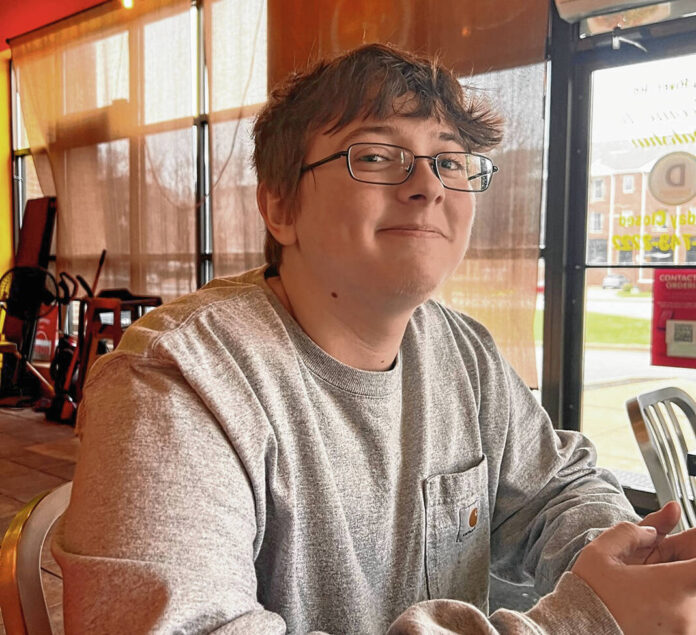A long-time doctor in Columbus who has a transgender son says that a proposal to ban gender-affirming care in Indiana sends a “really detrimental message” and would block “what we know is the best treatment” for some transgender youth.
Indiana Republicans advanced a bill last week prohibiting transgender youth under 18 from receiving puberty blockers, hormone therapy and surgeries to treat gender dysphoria, treatments that doctors and major medical groups say are evidence-based, medically necessary and sometimes even lifesaving.
The proposed ban, SB 480, has received strong support from state lawmakers who represent areas of Bartholomew County, including Sen. Greg Walker, R-Columbus, who is a co-author of the bill, and Rep. Ryan Lauer, R-Columbus, who authored a bill with similar language this session.
“It sends a really detrimental message to people,” said Dr. Slade Crowder, a longtime physician in Columbus who has held several positions at Columbus Regional Health. “I mean, deeming this illegal when the medical community knows that it’s helpful and it helps people … clearly sends an incorrect message that (being transgender) is wrong. Transgender people are already marginalized.”
Crowder, who is CRH’s director of medical informatics, said he is speaking from his own experience as the father of a transgender son who has undergone some of these treatments.
He said his son needed to see five healthcare professionals in order to undergo treatment.
“So, five healthcare professionals, the guardian and parent and a patient, and then the medical community (had to be on board),” Crowder said. “…And this bill puts the government between all of those people and the patient and says, ‘No, none of you know what’s best for a patient. We don’t believe in autonomy. We don’t believe in self-determination. We will tell you how to live your life.’ It’s incredible to me.”
‘I’m so happy’
Crowder’s transgender son, Charlie, agreed to speak with The Republic about his experience with gender dysphoria and transitioning.
Charlie Crowder, 21, is a senior at Purdue University. He said it was around eighth grade when he really started to notice that he definitely wasn’t a girl.
He was born biologically female and was originally named Charlotte, he said. But roughly around the time he started puberty, he said he was experiencing physical discomfort with his body.
Gym class was particularly difficult, he recalled. He remembered asking his gym teacher if he could be on the boys’ team, but the teacher got upset with him and told him, “‘if you use the girls’ locker room and the girls’ restroom, then you’re going to be on the girls’ team.’”
“I still think about that now,” he said.
It took some time for him to figure out where he landed on the spectrum of gender identities and that “it was hard to really come to terms with it,” he said.
He said that he didn’t like to go out in public because he didn’t like people looking at him “and seeing a girl.”
Charlie Crowder said that he started seeing doctors about potential treatments a few years ago, but that “it’s definitely a pretty long and involved process.”
“There’s a lot of people you have to talk to, and it’s a bit complicated,” he said.
After turning 21, he started testosterone treatments and eventually underwent surgery to have most of his breast tissue removed to have a more masculine-looking chest, he said.
“I never really felt any doubt that I wanted it,” he said. “I wanted it for a really long time before I actually did it. When I was 16, I was like, ‘Well, I’ll do it when I’m 18.’ And when I was 18, I was just really struggling to get out there and jump through the hoops, because it was hard and involved a lot of going out in public, which I hated.”
He said he is certain that he had the mental capacity as a teenager to understand what getting these treatments meant. And he has no regrets about getting them.
“I’m so happy,” he said. “…I like going out in public again, it’s like I can just actually live as a person now.”
“It has been the best thing that has ever happened to me,” he added.
Reaching out
Dr. Slade Crowder said he attempted to speak with Lauer about the legislation and invited the state representative to a CRH board meeting earlier this year to hear his son’s story and discuss aspects of the bill Lauer had introduced. However, he said that he never heard back from Lauer, adding that “it’s disgraceful that he would write legislation on something that he doesn’t even want to talk to medical leaders (about) in his own community.”
Lauer said he didn’t recall receiving any invitations from medical leaders in Columbus who wished to discuss his proposed ban on gender-affirming care or similar proposals introduced in the Legislature this session.
Lauer said he “absolutely” consulted with physicians, nurses and “other people in the healthcare industry” when drafting HB 1231, a proposal that included similar language to the bill currently pending before the governor.
However, he wouldn’t say who he consulted, citing privacy concerns, but said that the topics of conversation included “medicalizing children and experimenting on children.”
“It’s appalling to me. I think it’s wrong,” Lauer said, referring to the gender-affirming care that would be banned under SB 480 and would have also been banned under his own legislation.
“I don’t think that the vast majority of doctors and nurses agree with experimenting on children, and for those in the medical profession who are pushing these for young children, I think they’re wrong,” Lauer continued. “And I think that it would be helpful for … the doctors to be public about what they’re doing.”
Local doctors, as well as the broader medical community, including major medical groups such as the American Academy of Pediatrics, American Medical Association, American Psychological Association, Endocrine Society, among many others, strongly disagree with the suggestion that these treatments are dangerous or experimental.
Instead, they recommend them and have released statements condemning bans similar to the one in Indiana that is pending before the governor.
The American Academy of Pediatrics and other groups have filed amicus briefs in support of legal challenges brought by the American Civil Liberties Union in several states that have passed similar bans.
The Endocrine Society, a medical organization in the field of endocrinology that includes more than 18,000 investigators and clinicians around the world, called a similar ban in Florida “anti-science.”
“Medical evidence, not politics, should inform treatment decisions,” the Endocrine Society said in a statement last year.
“These medicines aren’t new,” Dr. Crowder said. “Transgender issues and gender dysphoria are not new. …There have been 16 quantitative studies on transgender care in youth. Those studies show outcomes of increased general function, increased well-being, decreased depression, decreased anxiety, decreased suicidality. For people who have surgery, there’s a 99% satisfaction with surgery. These are the outcomes of the studies.”
When asked why the state of Indiana should intervene and make medical decisions on behalf of parents and a team of licensed physicians and mental health professionals who are following guidelines and evidence-based practices endorsed by dozens of medical associations, Lauer said: “It’s clear that the state has the authority to regulate the healthcare, medical industry, and I think this is an appropriate line to protect children.”
But many doctors, as well as transgender youth and their families, say that they are struggling to understand what the proposal is protecting children from.
“The parent, the child and all these doctors all think this is the right thing, but Ryan Lauer is going to get in the middle of that group and telling them what they should do,” Dr. Crowder said. “I honestly can’t recall a time in my life in medicine where somebody proposed blocking what we know is the best treatment,” he added.





